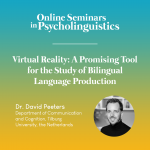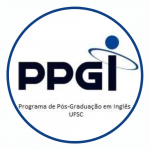Online Seminars in Psycholinguistics
The Language and Cognitive Processes Lab (LabLing/UFSC) and the Bilingual and Multilingual Language Processing Research Group (Plibimult/UFC) would like to invite you to the Online Seminars in Psycholinguistics, a series of videoconferences related to language learning and processing.
Language Processing Research Group (Plibimult/UFC) would like to invite you to the Online Seminars in Psycholinguistics, a series of videoconferences related to language learning and processing.
The first videoconference of the series will be presented by Prof. Dr. David Peeters (Tilburg University, the Netherlands), on 02 July 2020, at 1 pm (Brasilia time). The talk will be streamed live on PPGI Youtube channel and you can use the chat to post your questions and comments.
Certificates will be available for each videoconference. Information about certificates will be given during the talk.
Please join us in the Seminars!
Virtual Reality: A Promising Tool for the Study of Bilingual Language Production
Dr. David Peeters, Department of Communication and Cognition, Tilburg University, the Netherlands
02/07/2020 – 1 pm (Brasilia time)
Live on PPGI-UFSC Youtube channel
Virtual Reality (VR) technology is increasingly used as a tool for psychological research. In the language sciences, however, its use has long remained virtually non-existent. In this talk, I will argue that immersive VR technology offers unique possibilities to answer fundamental questions about the neurocognitive mechanisms supporting human language and communication. More than other methods, it combines ecological validity, experimental control, and repeatability in experimental settings. Moreover, as a mode of display, it can relatively easily be combined with the collection of EEG, eye tracking, and motion capture data to track online linguistic and communicative processes. I will discuss ongoing work from our lab that shows the added value of VR in the study of bilingualism, specifically focusing on the mechanisms that allow bilinguals to switch between languages and listeners when producing speech.
Bio
Dr. David Peeters is an assistant professor in the department of Communication and Cognition at Tilburg University, the Netherlands. In his work, he makes use of immersive virtual reality (VR) technologies to study human linguistic and communicative capacities in rich and dynamic audiovisual contexts. Specifically, he applies VR in combination with motion tracking, eye tracking, and electroencephalography (EEG) to learn more about the cognitive and neural underpinnings of language and communication in domains such as neuropragmatics, multimodal and non-verbal communication, and multilingualism. He did his doctoral research at the Max Planck Institute for Psycholinguistics and is currently funded by a Veni grant from the Dutch Research Council (NWO).








